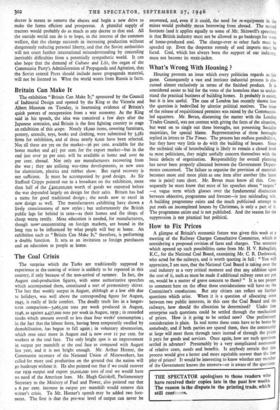The Coal Crisis
The surprise which the Turks are traditionally supposed to experience at the coming of winter is unlikely to be repeated in this country, if only because of the non-arrival of summer. In fact, the August coal-production figures, with some authoritative speeches which accompanied them, constituted a sort of premonitory shiver. The fact that weekly output in August, although at a low ebb due to holidays, was well above the corresponding figure for August, 1945, is really of little comfort. The deadly truth lies in a longer- term comparison-3,065,500 tons per week produced in August, 1946, as against 4,437,000 tons per week in August, 1939 ; in recorded stocks which amount overall to less than four weeks' consumption ; in the fact that the labour force, having been temporarily swelled by demobilisation, has begun to fall again ; in voluntary absenteeism, which rose once more in August and is now over 11 per cent. for workers at the coal face. The only bright spot is an improvement in output per manshift at the coal face as compared with August last year, and it is not bright enough. Mr. Arthur Homer, the Communist secretary of the National Union of Mineworkers, has called for more coal production on the ground that the nation will go bankrupt without it. He also pointed out that if we could recover our 7939 output and export 50,000,000 tons of coal we would have no need of the American loan. Mr. Hugh Gaitskell, Parliamentary Secretary to the Ministry of Fuel and Power, also pointed out that a 6 per cent. increase in output per manshift would remove this winter's crisis. To Mr. Homer's speech may be added two foot- notes. The first is that the pre-war level of output can never be recovered, and, even if it could, the need for re-equipment in the mines would probably mean borrowing from abroad. The second footnote (and it applies equally to some of Mr. Shinwell's speeches) is that British industry must not be allowed to go bankrupt for want of home-produced coal. The change-over to other fuels must be speeded up. Even the desperate remedy of coal imports must be faced. Coal, which has always been the support of oar industry, must not become its strait-jacket.


























 Previous page
Previous page